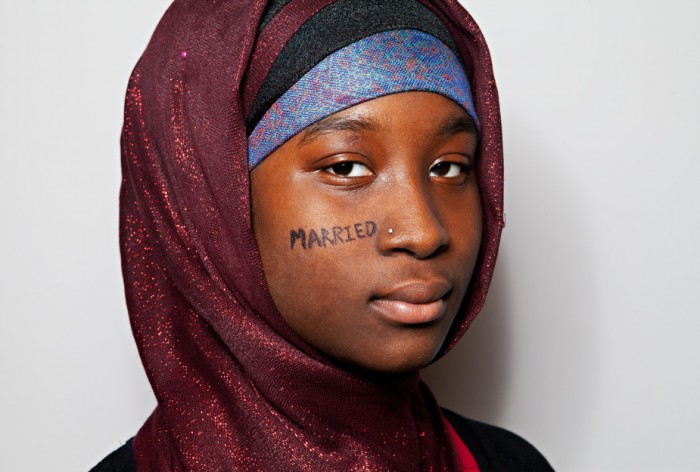
“I am not my arrangement.”
Kujegi Camara, 20, Princeton University.
Steve Rosenfield is the creator & photographer of the powerful What I Be Project. He approached me to help share how the project is changing the lives of participants—one story at a time.
Kujegi, pronounced ‘koo-jeh-jee’, was born in America to Gambian parents. She grew up in a Muslim household with seven other siblings. Ten people to the household. She currently attends Princeton University on a full scholarship. If you can imagine, that’s a pretty big deal for a child of immigrants to attend one of the world’s most prestigious universities.
During her high school years, Kujegi’s parents had arranged her to marry a man in their home country. This was not a big deal at first, but as she got older, she became sensitive to how this would be perceived in American culture. She spiraled through bouts of depression and anxiety.
She was angry with herself, her culture and her religion.
Nevertheless, she was to wed a man she had never met.
Although the thought of an arranged marriage is mind-bending to most Americans, take a second to settle into Kujegi’s shoes. She is a Gambian-American Muslim who was born & raised in the Bronx—a culturally diverse borough in New York City.
Unfortunately for Muslims in America, regardless of Islamic subdivision, the tragedy on September 11, 2001, would leave a bitter taste in the mouths of Americans at large. It’s important to understand this because Muslim Kujegi would be raised in the emotionally charged New York City. More specifically, Kujegi grew up learning what it meant to be Muslim in the wake of America’s most deadly terrorist attack—which had been ordered by Muslim extremists.
Every person has their own story. This is Kujegi’s.
Kujegi admits that she struggled with trying to be Gambian Muslim and American at the same time. Cultural experiences that carry significant conflict. Naturally, as a college student in the United States, her environment and peers forced her to think critically of her Gambian culture. Simultaneously growing up with and identifying with her Gambian culture, she was forced to think critically of American culture.
To simplify, I would equate this to people being half-white/half-black and attending a primarily white school in America. White people would probably just consider you black. Black people would probably say you’re not black. So what are you? I grew up witnessing that. No doubt, a confusing place to be for any teenager.
Considering Kujegi doesn’t have any personal experience to say “this is what I’m supposed to feel in this situation”, her insecurity with cultural identification is justified. It is real. It is relevant. Even the greatest parents in the world cannot protect their children from their own children’s need to make up their own mind.
Kujegi’s conflict was not about being Gambian or American. It wasn’t about denouncing or proclaiming one or the other. It was about her finding acceptance from two cultures she has love for. Because, in America, the term “arranged marriage” is something to be easily critical of, Kujegi kept that conversation to herself.
“Before I went to Gambia, I even deactivated my Facebook because I didn’t want anyone to know. What if my teachers found out? Its not a typical American thing and so that’s my struggle.”
The day came. Kujegi and her mother flew to Gambia and she was married as arranged in a cultural wedding ceremony. She and her husband, Muhammed Camara, 30, had about six weeks to get to know each other.
Kujegi, almost surprised by the fact, says, “It felt really good to be loved like that.” Dating is not allowed in her culture so the concept of this type of affection is new to her. It’s exciting.
Their time ran up and she flew back to the states to begin her sophomore year at Princeton.
She was a married 19-year-old attending college in the United States. By most American standards, a conundrum.
“I always stop myself from sharing. But I felt like I was cheating a lot of people or lying to them. I felt really scared that if I told people my story they would tell me they wouldn’t understand. I didn’t know how to balance these two worlds I was living in. Marriage is supposed to be a thing you tell people and they’re happy for you. I made it private and secretive. I had to hide it.”
When the What I Be Project came to Princeton University, Kujegi was scared, but had decided it was time to tell her story. She was 1 of 63 participants who would agree to be photographed.
Even some of her closest friends had absolutely no idea she’d been married. Until, of course, Kujegi’s startling image would go public in a matter of days.
She shares, “Steve said ‘I’ll put it up in a bit.’ I was freaking out. I was crying. I don’t think I’m ready for this.”
Steve posted the image to Facebook on March 7, 2014.
“People came up to me to thank me. I’m not good with compliments,” she laughs. “It was just good for people to know my voice. This a part of me, but I don’t want it to define me.”
This is the crux of the project. Identifying with your insecurity, but understanding that you are not defined by it. This is why every image title begins with “I am not my…”.
“People would tell me that I’m the same person and they don’t see ‘married.’ People really embraced me. We got back to our normal lives. I appreciated that. Everyone made it seem normal.”
As for her family, her parents aren’t on Facebook. She’s okay with keeping them at an arms length from the image for now. She thinks it’s unlikely they’ll see it and she’s not interested in introducing it to them. She isn’t confident they’ll be able to understand the scope of the project or the context in which she participated. She laughingly considers bringing it up 20 years from now. She mentions more than once how much she loves them.
“My sisters saw the post. At first they were like ‘what?’ For them it was really nice for them to see other people’s reactions. They know I struggled, but I don’t think they knew to the extent that I struggled. This makes them see that.”
Finally, a word on the actual marriage.
“We talk every day. It’s kind of exciting because you’re always learning something new about the other person. It’s like a long distance relationship. Eventually he’ll come here. But I’m happy now. That was something I wasn’t sure how to convey to people. That I was happy because I didn’t want people to just be happy.”
She wanted to be accepted. She wanted to be understood.
With herself and the What I Be Project to thank, she is.
You can read Kujegi’s personal statement at the project’s website.
Kujegi is also an extremely talented poet and spoken word performer. In true Elephant Journal form, I wanted to share one of her pieces.
Gambia
I was born on the frail hands of the
American Dream that keep my dad’s eyes
Blood shot red, my mom’s tears
Flowing like wild-flowers— stuck, she
Never buried her mother and
Dad’s not the same anymore.
Insomnia. Whispers.
My grandmother screams at him to come home.
He is jailed in freedom
The land that cradled Me will
not give him that green card
So he can go and touch her wind-rattled hands, so
I call You home.
I remember the day we met,
I was eleven then, you smiled at me.
Your smile I wanted to take
To put on my dad’s face
To remind him that you will never forget
But sometimes, I am thorn.
Afraid, I am your contradiction
Foreign, my blood faints your heartbeat.
Timid of rejection
I have loved you because it was you that never
Said I was ugly like the girl in third grade.
It was you who my parents’ heart belonged to
“Like mother like daughter.”
Long distance relationships have a tendency to fail.
Something in me, you’ve kept
You’ve been in my dreams and I can hear you run, drowning for air
Screaming at me in sweet murmurs
Tugging at my leg to never forget the way the sand
Feels when tucked under bare feet.
You do this to me. You and I,
We speak in brightly colored silences.
Sometimes,
I am afraid to know you
Because you know me so well.
***
Steve Rosenfield’s What I Be Project encourages millions, globally, to courageously address their insecurities. What started as an experiment in 2010 has since transformed into a full-blown, and sometimes, controversial movement. The subject of an image will share verbiage on his or her skin related to their insecurity. They accept this as part of who they are, however, acknowledging it does not define their whole being. Steve clicks the shutter and posts the photograph online.
***
More from Ben and Steve on the What I Be series:
>Trigger Warning: Madison
>18 Elderly Share Their Insecurities Before it’s Too Late
Love elephant and want to go steady?
Sign up for our (curated) daily and weekly newsletters!
Editor: Renee Picard
Photo credits: What I Be Project by Steve Rosenfield






Read 2 comments and reply